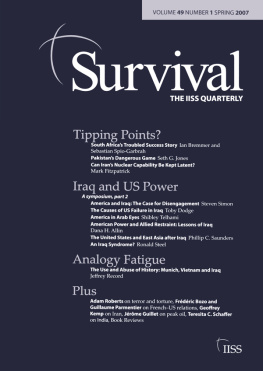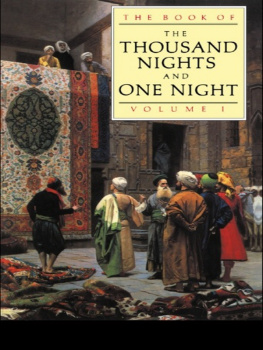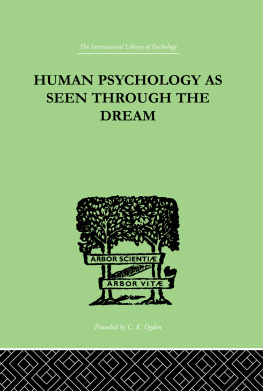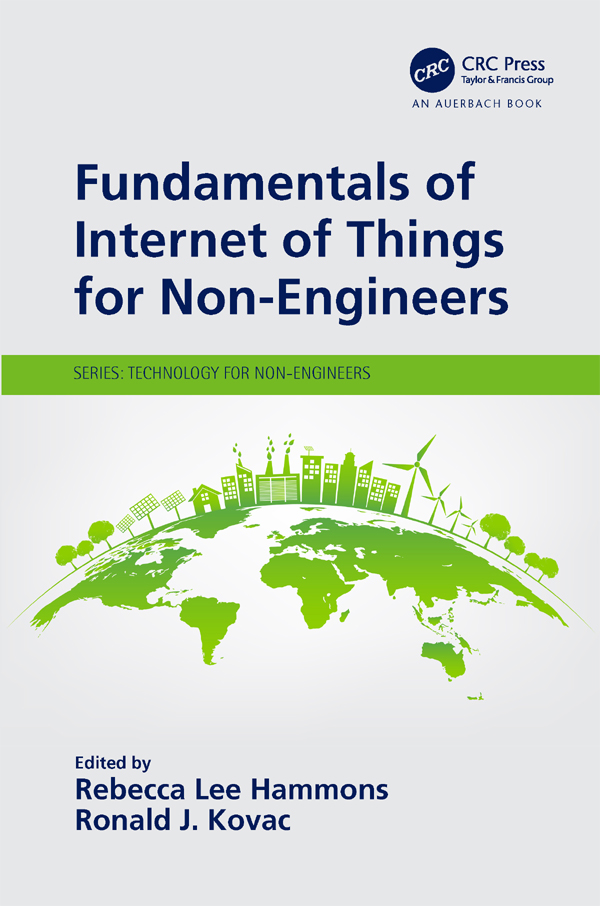Contents
Landmarks
Fundamentals of Internet of Things for Non-Engineers
Fundamentals of Internet of Things for Non-Engineers
Edited by
Rebecca Lee Hammons and Ronald J. Kovac

CRC Press
Taylor & Francis Group
6000 Broken Sound Parkway NW, Suite 300
Boca Raton, FL 33487-2742
2019 by Taylor & Francis Group, LLC
CRC Press is an imprint of Taylor & Francis Group, an Informa business
No claim to original U.S. Government works
Printed on acid-free paper
International Standard Book Number-13: 978-1-138-61085-9 (Hardback)
This book contains information obtained from authentic and highly regarded sources. Reasonable efforts have been made to publish reliable data and information, but the author and publisher cannot assume responsibility for the validity of all materials or the consequences of their use. The authors and publishers have attempted to trace the copyright holders of all material reproduced in this publication and apologize to copyright holders if permission to publish in this form has not been obtained. If any copyright material has not been acknowledged please write and let us know so we may rectify in any future reprint.
Except as permitted under U.S. Copyright Law, no part of this book may be reprinted, reproduced, transmitted, or utilized in any form by any electronic, mechanical, or other means, now known or hereafter invented, including photocopying, microfilming, and recording, or in any information storage or retrieval system, without written permission from the publishers.
For permission to photocopy or use material electronically from this work, please access www.copyright.com (http://www.copyright.com/) or contact the Copyright Clearance Center, Inc. (CCC), 222 Rosewood Drive, Danvers, MA 01923, 978-750-8400. CCC is a not-for-profit organization that provides licenses and registration for a variety of users. For organizations that have been granted a photocopy license by the CCC, a separate system of payment has been arranged.
Trademark Notice: Product or corporate names may be trademarks or registered trademarks, and are used only for identification and explanation without intent to infringe.
Visit the Taylor & Francis Web site at
http://www.taylorandfrancis.com
and the CRC Press Web site at
http://www.crcpress.com
It all started, in our minds, with a discussion some years ago. The discussion was energetic and dealt with the then-known Internet. Why didnt the Internet connect everything, not just people and computers? Little did we know, this was the start of our involvement with IoT, the Internet of Things, and not what we called it years ago, the Internet with Everything.
The IoT is the next manifestation of the Internet. The trend started by connecting computers to computers, progressed to connect people to people, and is now moving to connect everything to everything. The movement started like a racewith a lot of fanfare, excitement, and cheering. Were now into the work phase, and we have to figure out how to make the dream come true. What is the dream? It manifests in different ways for each of the participating vertical industries, but its essence is the sameto enhance the effectiveness and efficiency of processes and procedures. IoT can help with the safety of an older person in their home or can help produce better and cheaper products. IoT can reap significant amounts of valuable, and not so valuable, data to enhance our strategies and tactics. The value is in how we embrace the basic concepts of the Internet and the IoT.
The IoT will have many faces and involve many fields as it progresses. It will involve technology, design, security, legal policy, business, artificial intelligence, design, Big Data, and forensics; about any field that exists now. This is why we decided to write the book. We saw books in each one of these fields, but the focus was always an inch wide and a mile deep. We wanted a book that would introduce the IoT to the non-engineer and allow them to dream of the possibilities and explore the work venues in this area. We wanted a book A mile wide and a few inches deep. We think we have met this goal by engaging experts from a number of fields and asking them to come together to create an introductory IoT book. We hope you agree.
Co-editors:
Drs. Rebecca Lee Hammons and Ronald J. Kovac
An adventure such as this is not possible without the sincere help, assistance, and hard work of many people. The list of people who we would love to thank can go on forever, but we will limit it to two groups who helped immeasurably to get this book started and launched.
Research Assistants: We are lucky enough to have many research assistants at Ball State University in the Center for Information and Communication Sciences who help us with our academic and project workloads. For this book, our assistants dug out research facts, performed editing, created figures and diagrams, and performed a lot of the yeomans work that is necessary for a venture of this size. We sincerely thank the following CICS research assistants: Zoey Spangler, Ethan Atkins, Rashida Peete, Alex Peczynski, Nick Benedict, Eric Satterthwaite, Konnor Miller, and Tiago DeMesquita.
Outside Reviewers: After writing each chapter, it was reviewed by each co-editor, the research assistants, other authors, and finally the whole book was reviewed by Outside Reviewers. These people had a fresh look at the whole book and used their extensive experience in the ICT world to read hundreds of pages, look at innumerable diagrams, and critique our work from the lowest level (spelling and grammar) to the highest (communication and accuracy). We would like to thank the following people who served in this role and to whom we owe a big debt of gratitude: Judy Off, Jaki Lederman, Rayford Steele, Ana and John Combs, and William A. Howard.
Dr. Rebecca Lee Hammons has extensive technology industry experience in establishing and leading software quality assurance, development lifecycle services, and project management teams. She has worked for Ontario Systems, Apple, Raytheon, Tivoli Systems and Wang, in addition to several niche software firms. She is a certified quality manager and certified software quality engineer with the American Society for Quality (ASQ) and a Certified Scrum Master and Certified Scrum Product Owner with Scrum Alliance. Dr. Hammons is an associate professor at Ball State University. Her technology research interests include Slow Tech, Usability, Burnout Theory, and Gold-Collar Workers. Dr. Hammons thrives on leading organizational change initiatives and coaching individuals and teams to reach their full potential.
Dr. Ronald J. Kovac, is a full professor in the Center for Information and Communication Sciences at Ball State University in Indiana. The center prepares graduate students in the field of telecommunications. Previous to this position, Dr. Kovac was the telecommunication manager for the state of New York and a CIO for a large computing center located on the east coast. Dr. Kovacs previous studies included electrical engineering, photography, and education. Dr. Kovac has published two books and over 50 articles and has completed numerous international consulting projects in both the education and telecommunications field. Additionally, he speaks worldwide on issues related to telecommunications and holds numerous certifications, including the CCNA, the CCAI, and the almost complete CCNP. Dr. Kovac is also a Fulbright Scholar and loves life, education, and technology.








